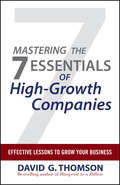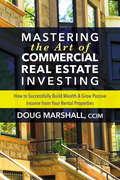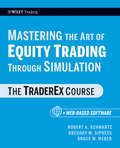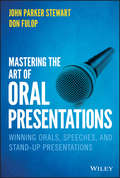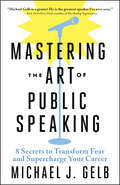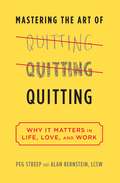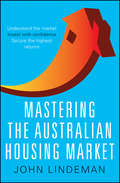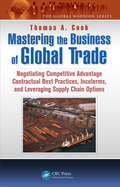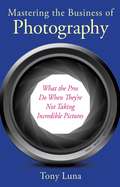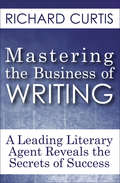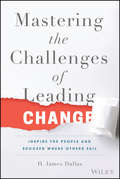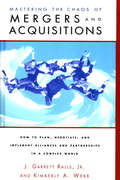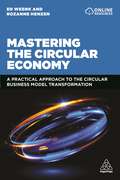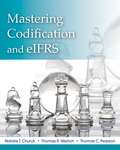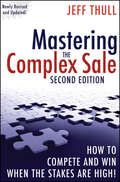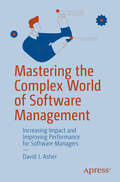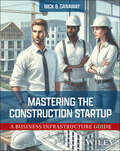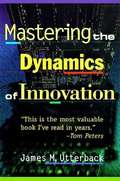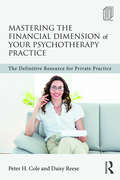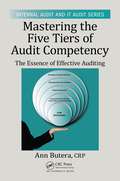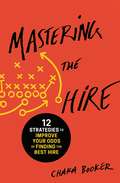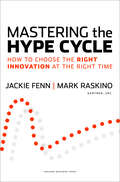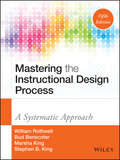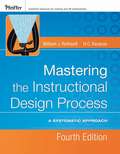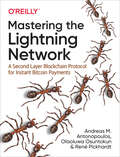- Table View
- List View
Mastering the 7 Essentials of High-Growth Companies
by David G. ThomsonPractical strategies to propel your company to the top American business is entering unchartered territory. Recent trends suggest that we are moving out of a recession-fairly labeled The Great Recession-into a recovery phase characterized by high unemployment with growth. As such, the business road ahead will be challenging. Growth will be harder to achieve and business failure will be more prevalent. But the best of America's growth businesses will pass through this cycle to experience renewed and hopeful growth in contrast to the high failure rate of those who fail to grow. The numbers are proving this to be the extreme case-a higher upside with a greater failure rate. What are America's recession-proof, highest growth companies doing differently? What are the values, fundamentals, and actions that will make the difference between failure, or just surviving and thriving? The answer to these questions is, what Thomson calls, The 7 Essentials-value proposition, high growth market segment, marquee customers, big brother alliances, exponential returns, inside/outside leadership, and essential board experts. This book is the timely answer to the search for what it will take to propel a company's growth through these challenging times. It's for management teams of any business, independent of size or industry, which desires to identify a course of action to improve their opportunities to grow. "Applying the 7 Essentials will improve your company's growth prospects," says author David Thomson. Growth companies are especially defined by their ability to grow through recession and recovery periods to become the new growth leaders. The case studies and the numbers in this book prove it. This reliable resource extends the insights from Thomson's bestselling book, Blueprint to a Billion: 7 Essentials to Achieve Exponential Growth to apply the 7 Essentials to all companies. Thomson is known as America's growth expert on what it takes to transform a small business into a billion dollar one. He has been recognized by Investors Business Daily as the "Guru for Uncovering the Blueprint for Sizzling Growth Companies. " Offers busy professionals essential insights that will move their business or business unit beyond surviving and into thriving now and in the future Written by an expert on how companies achieve growth in challenging markets Contains key CEO interviews and quick case studies and is supported by on-line scoring tools to help teams apply the 7 Essentials Economic weakness has not changed the need for companies to grow. This book provides you with a proven framework to overcome such challenges and thrive in today's challenging business environment.
Mastering the Art of Commercial Real Estate Investing: How to Successfully Build Wealth & Grow Passive Income from Your Rental Properties
by Doug MarshallMastering the Art of Commercial Real Estate Investing is a comprehensive guide about the time-proven principles and common-sense practices for successfully investing in real estate. Do you want to supplement your current income by investing in commercial real estate? Better yet, would you like to someday quit your day job and devote your energies exclusively to your rental properties? With over 35 years of commercial real estate experience, including a decade of personally investing in rental properties, real estate finance and investment expert Doug Marshall has explored every aspect of the commercial real estate process. Now, he’s sharing his knowledge to show readers how to add to or even replace their current income with commercial real estate investments. Mastering the Art of Commercial Real Estates is for both those who are new to investing and those who may need a little help learning investing’s time-proven principles, showing readers how to:Tap into the six immutable laws of commercial real estate investing to build wealth and grow income fastFind the best possible loan for their property to optimize the property’s cash flow Best manage their property to reduce risks and remove pitfalls to keep their investing profitable When to buy, and when NOT to buy their next rental property, and much, much more! If you like easy-to-follow, step-by-step instructions coupled with solid advice and insight, then you’ll love Doug Marshall’s life-changing, wealth-growing guide to make real estate work for you.
Mastering the Art of Equity Trading Through Simulation, + Web-Based Software
by Robert A. Schwartz Bruce W. Weber Gregory M. SipressAn interactive guide to successfully trading in today's marketsMastering the Art of Equity Trading Through Simulation is a guidebook to interactive computer trading simulation designed to provide participants with hands-on experience in making tactical decisions and implementing them in different market environments-from continuous order drive markets to call auction markets, and from dealer markets to dark liquidity pools.By showing traders how to operate in these different markets, this reliable resource quickly reveals a good deal about what trading involves and how market design impacts trading decisions.Provides a virtual platform that gives users hands-on experience in making tactical trading decisionsShows exactly how prices are established in the marketplaceTeaches how the structure of a marketplace influences participant decisionsLearning to trade through study is like learning about a roller coaster ride verbally. You may get the idea of going up and down and around curves, but will lack the actual experience. Mastering the Art of Equity Trading Through Simulation will get you as close as possible to the markets-without actually going in them-and prepare you to profit once you're really there.
Mastering the Art of Oral Presentations: Winning Orals, Speeches, and Stand-Up Presentations
by John P. Stewart Don FulopProven techniques to win over any audience and make any sale Mastering the Art of Oral Presentations is your expert guide to delivering memorable and effective speeches and presentations. Whether selling a product, offering a service, or bidding for a contract, your oral presentation skills can often determine success or failure. This invaluable resource delivers real-world advice and proven strategies to elevate your game and close the deal. Comprehensive coverage of preparation procedures, delivery techniques, and presentation strategies provide you with the tools and knowledge to motivate and persuade your audience. Emphasizing real-world versatility, this unique book delivers methods equally effective to both individual and team presentations. Drawing from decades of experience, authors John Parker Stewart and Don Fulop offer keen insight into the process of winning over an audience. From topics ranging from rhetorical devices and visual cues to body language and stage presence, this expert guide will help convey a take-home message that resonates and endures long after your presentation has concluded. A must-have resource for government contractors, sales and marketing professionals, and anyone seeking to raise the level of their oral presentation skills, this book will help you: Develop winning approaches to oral presentations regardless of experience or skill level Build the confidence to present your ideas to individuals, teams, and large audiences Incorporate your personal and professional lives into your communication strategies Create and deliver messages that will win the hearts and minds of any audience Mastering the Art of Oral Presentations: Winning Orals, Speeches, and Stand-Up Presentations is an indispensable tool for those who speak to influence, to promote, and to sell—aiding you in making positive and lasting impressions on potential customers, team members, and decision makers.
Mastering the Art of Public Speaking: 8 Secrets to Transform Fear and Supercharge Your Career
by Michael J. GelbSeventy-four percent of Americans suffer from glossophobia, the fear of public speaking. In fact, even top professional speakers and accomplished actors experience butterflies before presenting. They never eliminate the butterflies; they just teach them how to fly in formation. How? Michael Gelb&’s techniques will help you clarify and shape your message so that your audience — no matter how big or small, in person or virtual — will care about it. Once the message is clear, he teaches you how to convey it in memorable, creative, and effective ways. Gelb shows that public speaking is a skill anyone can learn and enjoy. Mastering the Art of Public Speaking will guide you to rediscover your natural gift for communication while strengthening confidence and presence.
Mastering the Art of Quitting
by Peg Streep Alan BernsteinFind out why the happiest, most successful people have the ability both to persist and to quit. In a culture that perceives quitting as a last resort and urges us to hang in, Mastering the Art of Quitting tackles our tendencies to overanalyze, ruminate, and put a positive spin on goals that have outlived their usefulness. Bestselling author Peg Streep and psychotherapist Alan Bernstein demonstrate that persistence alone isn't always the answer. We also need to be able to quit to get the most out of life. They reveal simple truths that apply to goal setting and achievement in all areas of life, including love, relationships, and work: Quitting promotes growth and learning, as well as the ability to frame new goals. Without the ability to give up, most people will end up in a discouraging loop. The most satisfied people know when it's time to stop persisting and start quitting. Quitting is a healthy, adaptive response when a goal can't be reached. Featuring compelling stories of people who successfully quit, along with helpful questionnaires and goal maps to guide you on the right path, Mastering the Art of Quitting allows you to evaluate whether your goals are working for or against you, and whether you need to rechart certain aspects of your life. When is it time to stop persisting and start quitting? Take a moment and answer the following questions. Just thinking about the answers will give you insight into your ability to quit artfully and restart your life. Do you believe that "winners never quit and quitters never win"? How realistic are you when it comes to setting goals? What matters more: staying the course or exploring new possibilities in life? How much of your sense of self relies on other people's judgments? Do you tend to hang in longer than you should, even when you're unhappy? When you try something new, do you focus on the effort you have to put in or the possibility of failure? Are you a procrastinator or a delayer when it comes to getting things done? How much do you worry about making a mistake? Do you second-guess yourself? How hard is it for you to get over a setback?
Mastering the Australian Housing Market
by John LindemanWanting to invest in property but don't know where or what to buy?Feeling overwhelmed by all the property market information that's available?In Mastering the Australian Housing Market property expert John Lindeman provides the information and tools you need to invest with confidence, explaining when to buy, where to buy and what to pay. He also shares some invaluable truths that will help you avoid the mistakes may investors make and get the best people results from your investments.Inside you'll discover:how the Australian housing market workshow to test the information you heard about the marketwhere to buy for high capital growth and rental returnstechniques and tools to estimate property values and predict expected returnsthe best time to buy and sell.Easy-to-understand case studies show you how to undertake your own market analysis, using data that is freely available. Mastering the Australian Housing Market is a must-read for anyone looking to succeed on their property investment journey.
Mastering the Business of Global Trade: Negotiating Competitive Advantage Contractual Best Practices, Incoterms, and Leveraging Supply Chain Options (The Global Warrior Series)
by Thomas A. CookMuch of your company‘s success in global trade will be determined by how well you manage contracts and agreements for sale or purchase. Mastering the Business of Global Trade: Negotiating Competitive Advantage Contractual Best Practices, Incoterms, and Leveraging Supply Chain Options explains the key elements any international business person must
Mastering the Business of Photography: What the Pros Do When They're Not Taking Incredible Pictures
by Tony LunaPhotography can be a competitive and unforgiving trade, however there are many strategies for professional success. This book is a resource for photographers of all kinds and demonstrates the many ways to manage a career in photography, while still "earning enough money to support yourself, a family, your interests, your aspirations, and your passion." Mastering the Business of Photography offers insights into what happens when you're not shooting-which is most of the time-and explains what you must do to further your career, make a living, and accomplish your personal goals. Topics include: Organizing assignments from start to finish Creating a plan and calculating risks Building a standout portfolio Anticipating financial matters Working with clients Self-promoting Getting paid Booking gigs Negotiating a contract And much moreFor freelance photographers and for those employed by agencies as well, this guide is full of practical advice for navigating the world of photo work, coming from an industry professional with over forty years of experience.
Mastering the Business of Writing: A Leading Literary Agent Reveals the Secrets of Success
by Richard CurtisOne of the most comprehensive guides currently on the market, MASTERING THE BUSINESS OF WRITING is an insider's guide to the business of being a professional writer. All aspects of the publishing industry are explained, both for the aspiring author and the established writer wishing to jump start a professional career. This guide includes everything you need to know about publishers, agents, and the track to success, including: What agents do and how they develop relationships within the publishing industry that can be beneficial to your career; the best way to formulate a book proposal that sells; what publishers are really looking for in a book—and what they aren't; understanding technicalities of advances, contracts, multibook deals and subsidiary rights; the significance of sales conferences and bookstore chains; essential manners and protocols for establishing positive relations with your agent, editor and publisher, legal issues, copyright, and much, much more....
Mastering the Challenges of Leading Change: Inspire the People and Succeed Where Others Fail
by H. James DallasConquer the most daunting change initiative with the right people, tools, and strategies. James Dallas' Mastering the Challenges of Leading Change is an informative, insightful guide to effectively leading the transition through change. While most change management books present case studies about what happened at other companies, this book is based on the author's own experiences managing over 10 transformational and turnaround initiatives, 15 acquisition integrations, and 5 operations/quality shared services centers of excellence. By relating personal lessons learned, how they were subsequently applied, and how you can benefit from them, this book provides a unique first-hand perspective on successful agents of change. You'll learn the qualities and skills required to usher in the new paradigm, and how to break a large initiative into manageable chunks that are more likely to proceed as planned. By crafting your strategy based on proven methods, you're far and away more likely to meet or even exceed your change objectives. The majority of change initiatives fail because people mistakenly think that a change agent is the same as a project leader. They're not. This book shows you why, and how get the tools, strategies, and people you need at the helm of your initiative to come out the other side much stronger as an organization. Learn the critical skills required for effective change management Assess the difficulty and politics of a change initiative Choose the right people to help implement the change See past obstacles and lead effectively in a crisis Change is occurring within and across all industries, countries, and organizations. They begin with the best of intentions, but most fail to meet their objectives. Don't let your organization be one of the failures. Mastering the Challenges of Leading Change shows you how to plan, lead, and manage a successful transition.
Mastering the Chaos of Mergers and Acquisitions
by J. Garrett Ralls Jr. Kiberley A. WebbThis book reveals the complexity of mergers and acquisitions, and explains how to master it. From doing the deal to making it work, this comprehensive book discusses every aspect of successfully growing your business through mergers and acquisitions.Based on models of complexity, it book shows that complexity in business, as in nature, eventually falls into patterns. By recognizing and taking advantage of these patterns, business leaders can turn weaknesses into strengths, chaos into order, and separate, living organizations into a powerful alliance.This book provides a conceptual framework plus proven templates and real-life examples to guide readers through the twists and turns of forming and sustaining a business partnership. The authors' own experiences with companies such as Shell, Monsanto, and Lucent are the foundation for this thorough handbook.J. Garrett Ralls, Jr. is an international consultant specializing in managing complexity for effective partnering. He is a principal in an investment advisory firm guiding domestic and foreign joint ventures. His clients include many multinationals and governments.Kimberly A. Webb is a consulting associate for Ralls Associates. Her experience includes assignments with the US government, and other assignments in the US, Canada, and Europe. She recently participated in the war game for the President's Commission on Critical Infrastructure Protection and lectured at the US National Defense Center in Hawaii and the Monsanto Europe Technical Center.
Mastering the Circular Economy: A Practical Approach to the Circular Business Model Transformation
by Ed Weenk Rozanne HenzenGlobal consumption of raw materials currently goes beyond the earth's regenerative capacity, but the circular economy offers a more sustainable model which also provides new business opportunities. Mastering the Circular Economy is an introduction to circularity from a business and value chain management perspective. With many reflections and exercises throughout, the book draws a direct link between relevant recent theory and practice and offers students and practitioners a deeper understanding of the topic. It looks at both the macro and micro context of the circular economy, from the government and societal view to the impact of new business models in an individual company. Starting from the corporate imperative of moving from linear to circular business models, Mastering the Circular Economy covers the associated opportunities and challenges for organizations, from regulation and risk to value chain collaboration, reverse logistics and product quality. Part two of the book helps students to pull together everything they've learned and see how the concepts play out in the real world by guiding them through application in the online business simulation game The Blue Connection (free basic access is included with the book). Readers are continuously asked to reflect on the choices they would make in different roles to demonstrate a full understanding of the strategic and operational implications of the circular economy.
Mastering the Codification and eIFRS: A Case Approach
by Thomas R. Weirich Thomas C. Pearson Natalie T. ChurykChuryk, Weirich, and Pearson's Mastering Codification and eIFRS: A Case Approach is a new accounting book that focuses on teaching students how to use the FASB Codification and the IASB e-IFRS research databases. This is a perfect companion for an Intermediate Accounting, Accounting Research, or Advanced Accounting course, where research skills are integrated in the curriculum. In today's environment, professional accountants conducting financial accounting research will be utilizing some type of electronic research database. Understanding how to use the FASB Codification system is becoming more crucial to a student's success on the CPA exam and their success in the profession. Throughout the text, the authors use cases to step students through the fundamentals of how to conduct research at the professional level.
Mastering the Complex Sale
by Jeff ThullPraise for Mastering the Complex Sale"Jeff Thull's process plays a key role in helping companies and their customers cross the chasm with disruptive innovations and succeed with game-changing initiatives."--Geoffrey A. Moore, author of Crossing the Chasm and Dealing with Darwin"This is the first book that lays out a solid method for selling cross-company, cross-border, even cross-culturally where you have multiple decision makers with multiple agendas. This is far more than a 'selling process'--it is a survival guide--a truly outstanding approach to bringing all the pieces of the puzzle together."--Ed Daniels, EVP, Shell Global Solutions Downstream, President, CRI/Criterion, Inc."Mastering the Complex Sale brilliantly sets up value from the customer's perspective. A must-read for all those who are managing multinational business teams in a complex and highly competitive environment."--Samik Mukherjee, Vice President, Onshore Business, Technip"Customers need to know the value they will receive and how they will receive it. Thull's insights into the complex sale and how to clarify and quantify this value are remarkable--Mastering the Complex Sale will be required reading for years to come!"--Lee Tschanz, Vice President, North American Sales, Rockwell Automation"Jeff Thull is winning the war against commoditization. In his world, value trumps price and commoditization isn't a given, it's a choice. This is a proven alternative to the price-driven sale. We've spoken to his clients. This stuff really works, folks."--Dave Stein, CEO and Founder, ES Research Group, Inc."Our business depends on delivering breakthrough thinking to our executive clients. Jeff Thull has significantly redefined sales and marketing strategies that clearly connect to our global audience. Read it, act on it, and take your results to exceptional levels."--Sven Kroneberg, President, Seminarium Internacional"Jeff's main thesis--that professional customer guidance is the key to success--rings true in every global market today. Mastering the Complex Sale is the essential read for any organization looking to transform their business for long-term, value-driven growth."--Jon T. Lindekugel, President, 3M Health Information Systems, Inc."Jeff Thull has re-engineered the conventional sales process to create predictable and profitable growth in today's competitive marketplace. It's no longer about selling; it's about guiding quality decisions and creating collaborative value. This is one of those rare books that will make a difference."--Carol Pudnos, Executive director, Healthcare Industry, Dow Corning Corporation
Mastering the Complex World of Software Management: Increasing Impact and Improving Performance for Software Managers
by David J. AsherYou were a happy coder, then the opportunity came to lead a team. Unfamiliar assignments come without warning, team members need care and attention, and then the organization demands that you take on roles you hadn’t prepared for and work with people whom you have no idea what they do. It’s a struggle to keep up and often feels like thrashing rather than success. And yet, you are the lynchpin. Software Managers are responsible for critical product delivery and information processing in the largest and most impactful global companies and across nearly every industry and public sector. Some of the fundamentals like project management and team leadership have been well documented but the world keeps getting more complicated. This book reveals the breadth of domains that a Software Manager will encounter as they progress from competent contributor to tech lead to manager to increasing levels of responsibility. Even experienced managers will find helpful new perspectives and insights. You will be challenged to think more deeply about the people you may manage, the processes of developing products so complex that no individual can keep it all in their head, and the often-mysterious organizational behaviors surrounding you. Tech companies don't have to throw good practitioners into hard management positions with no training and compound the error as people advance in their management careers; it has just been our habit. We can do better. Mastering the Complex World of Software Management provides realistic scope, attacks the nitty-gritty realities, and challenges the reader to think about their situation so they can solve the myriad technical, process, organizational, and business challenges coming their way. What You Will Learn Master the fundamentals of managing technology teams See how operating teams navigate themselves within a larger organization Understand and work around the landmines in software development Who This Book is For Software developers who are considering a management path for their career; senior tech leads that are responsible for much of a software team's operation; software development managers that want to improve their capabilities in order to take on more responsibilities and earn a promotion.
Mastering the Construction Startup: A Business Infrastructure Guide
by Nick B. GanawayEQUIPS STARTUP CONTRACTORS WITH THE TOOLS TO BUILD RESILIENT INFRASTRUCTURE IN THE CONSTRUCTION INDUSTRY For construction professionals starting their businesses, success depends on more than just skill and dedication. Mastering the Construction Startup provides an essential master plan for creating the foundational infrastructure every contractor needs to achieve sustainable growth and upon which every strategic decision will be made. Written by industry expert Nick B. Ganaway, this real-world guide details how to strategically align people, systems, and processes with business goals to proactively address risks, reduce errors, and build lasting operational resilience. Grounded in decades of general contracting experience and research, each concise and accessible chapter breaks down the key components of sustainable success, such as identifying elements of a solid legal and financial base, establishing relationships with essential professionals, and creating a culture that attracts and retains the best talent. Throughout the book, Ganaway, often engaging directly with the reader, offers expert insights on everything from the role of the contractor to elements of leadership to advantages of niche contracting. Mastering the Construction Startup empowers contractors to set up their companies for success during the challenging early years and beyond. Here is a small sample of the principles discussed: Why your company’s culture is critical to your success and how to ensure it will be what you wantBilling procedures to follow to ensure that you get paid for your workYour essential need to hire the right lawyer and the right accountant for your business before your Day 1Your personal guarantee, its extreme risk for you, and what to do when it is requiredThe legal and financial consequences of improper business registration and professional licensingHow to choose the form of business structure best suited to your companyAn essential checklist for startups, and forms you can use The risks inherent in the Sole Proprietorship form of businessThe problems with partnerships and how to address them in advance Mastering the Construction Startup: A Business Infrastructure Guide is perfect for trade school and college courses in construction management and entrepreneurship, and a must-have resource for contractors, project managers, and subcontractors at all levels.
Mastering the Dynamics of Innovation
by James M. UtterbackFrom the back cover: "Utterback shows how innovation enters an industry, how mainstream firms typically respond...[he captures the rich history of innovation by inventors and entrepreneurs..."
Mastering the Financial Dimension of Your Psychotherapy Practice: The Definitive Resource for Private Practice
by Daisy Reese Peter H. ColeWritten by two therapists with extensive business experience, Mastering the Financial Dimension of Your Psychotherapy Practice addresses the clinical and financial challenges of establishing and maintaining a successful private practice. This book contains updated content on investing strategies, changes in the insurance marketplace, and trends in the marketing of a psychotherapy practice. The first of five sections explores the life cycle of the modern therapy practice, offering best business and investing practices for each phase. In the second and third sections, the authors consider the emotional dimension in the development of a private practice. The fourth section offers a basic course in financial planning, including an investigation into five common financial mistakes therapists make and various solutions to each situation. The fifth section is designed to offer a road map of actions to take in establishing a financial plan. Concluding the book is an inspirational discussion of how the therapist in private practice can create a career with meaning, fulfillment, personal satisfaction, and solid financial rewards.
Mastering the Five Tiers of Audit Competency: The Essence of Effective Auditing (ISSN)
by Ann ButeraRisk-based operational audits and performance audits require a broad array of competencies. This book provides auditors and risk professionals with the understanding required to improve results during risk-based audits.Mastering the Five Tiers of Audit Competency: The Essence of Effective Auditing is an anthology of powerful risk-based auditing pra
Mastering the Hire: 12 Strategies to Improve Your Odds of Finding the Best Hire
by Chaka BookerResearch shows you have a 50% chance of hiring the right employee . . . and a 50% chance of hiring the wrong one. It's a toss up, but it doesn't have to be.Mis-hires siphon your energy and erode team culture. Replacing them is stressful and can cost over $40,000 per re-hire. With the right tools, all of that can be avoided, and you can consistently make great hires.After years of scientific research and first-hand interview experience with thousands of candidates, Chaka Booker has created a system that helps employers consistently make great hires.Mastering the Hire provides 12 proven strategies that have been used to accurately identify the right talent 90% of the time. Whether hiring manager, business owner, CEO, search consultant, team manager, team member, novice or expert interviewer, Chaka's method is for anyone who wants to beat the hiring odds.In this book, you will learn:How to manage your intuition: when to trust it and when to put it aside.Question design principles: structuring questions so candidates are influenced to tell the truth.The power of pressure: when to apply or release pressure and how to control the hidden internal pressure that leads to poor decisions.To identify key competencies: the four competencies you must always interview for and techniques to accurately assess them.Tools for removing bias: tomorrow's talent doesn't fit yesterday's mold and is often overlooked.To reimagine the hiring process: resume reviews, phone interviews, and in-person interviews will get a much-needed revamp with innovative twists on each.The interview is the cornerstone of the hiring process, yet science has shown the odds aren't in your favor. Mastering the Hire provides strategies that will dramatically improve the one decision that determines everything you can accomplish--who you hire.
Mastering the Hype Cycle
by Jackie Fenn Mark RaskinoIt happens over and over again. Some innovation (a new product, a management trend) comes along that captures the public's imagination. Everybody joins the parade with great fanfare and high expectations. This "next big thing" promises to transform the companies that adopt it -- and inflict great peril on those that don't.Then, when the innovation fails to deliver as promised immediately, everyone starts bailing out. Investments are wasted; stock prices plunge; disillusionment sets in.It doesn't have to be this way. In Mastering the Hype Cycle, Jackie Fenn and Mark Raskino explain what drives this pattern and how your company can avoid its potential dangers. By understanding the hype cycle, you can ride it more skillfully -- timing your investment decisions so that the innovations you adopt stand the best chance of succeeding in the long-term.Drawing on company examples and Gartner's proven STREET (Scope, Track, Rank, Evaluate, Evangelize, Transfer) framework, the authors show how to orchestrate the key steps in the innovation-adoption process -- from choosing which innovations to take on and when in their life cycle you should adopt, to paving the way for a successful introduction.The hype cycle isn't going away. But this book arms you with the strategies you need to ride the crest of a new idea to success -- and steer clear of the trough of disillusionment.
Mastering the Instructional Design Process
by William J. Rothwell Stephen B. King Bud Benscoter Marsha KingA comprehensive framework for effective real-world instructional design Mastering the Instructional Design Process provides step-by-step guidance on the design and development of an engaging, effective training program. The focus on core competencies of instructional system design helps you develop your skills in a way that's immediately applicable to real-world settings, and this newly updated fifth edition has been revised to reflect the new IBSTPI Competencies and Standards for Instructional Design. With a solid foundation of researched and validated standards, this invaluable guide provides useful insight and a flexible framework for approaching instructional design from a practical perspective. Coverage includes the full range of design considerations concerning the learners, objectives, setting, and more, and ancillaries include design templates, PowerPoint slides, lecture notes, and a test bank help you bring these competencies to the classroom. Instructional design is always evolving, and new trends are emerging to meet the ever-changing needs of learners and exploit the newest tools at our disposal. This book brings together the latest developments and the most effective best practices to give you a foolproof framework for successfully managing instructional design projects. Detect and solve human performance problems Analyze needs, learners, work settings, and work Establish performance objectives and measurements Deliver effective instruction in a variety of scenarios Effective training programs don't just happen. Instructional design is a complex field, and practitioners must be skilled in very specific areas to deliver a training program that engages learners and makes the learning 'stick.' Mastering the Instructional Design Process is a comprehensive handbook for developing the skillset that facilitates positive training outcomes.
Mastering the Instructional Design Process
by William J. Rothwell Kazanas H. C.The fourth edition of Mastering the Instructional Design Process has been completely revised and updated and is based on the instructional design competencies of the International Board of Standards of Performance and Instruction (IBSTPI). The book identifies the core competencies of instructional system design and presents them in a way that helps to develop these competencies and apply them successfully in real-world settings. This comprehensive resource covers the full range of topics for understanding and mastering the instructional design process including: detecting and solving human performance problems; analyzing needs, learners, work settings, and work; establishing performance objectives and performance measurements; delivering the instruction effectively; and managing instructional design projects successfully.
Mastering the Lightning Network: A Second Layer Blockchain Protocol for Instant Bitcoin Payments
by Andreas M. Antonopoulos Olaoluwa Osuntokun René PickhardtThe Lightning Network (LN) is a rapidly growing second-layer payment protocol that works on top of Bitcoin to provide near-instantaneous transactions between two parties. With this practical guide, authors Andreas M. Antonopoulos, Olaoluwa Osuntokun, and Rene Pickhardt explain how this advancement will enable the next level of scale for Bitcoin, increasing speed and privacy while reducing fees.Ideal for developers, systems architects, investors, and entrepreneurs looking to gain a better understanding of LN, this book demonstrates why experts consider LN a critical solution to Bitcoin's scalability problem. You'll learn how LN has the potential to support far more transactions than today's financial networks.This book examines:How the Lightning Network addresses the challenge of blockchain scalingThe Basis of Lightning Technology (BOLT) standards documentsThe five layers of the Lightning Network Protocol SuiteLN basics, including wallets, nodes, and how to operate oneLightning payment channels, onion routing, and gossip protocolFinding paths across payment channels to transport Bitcoin off-chain from sender to recipient
